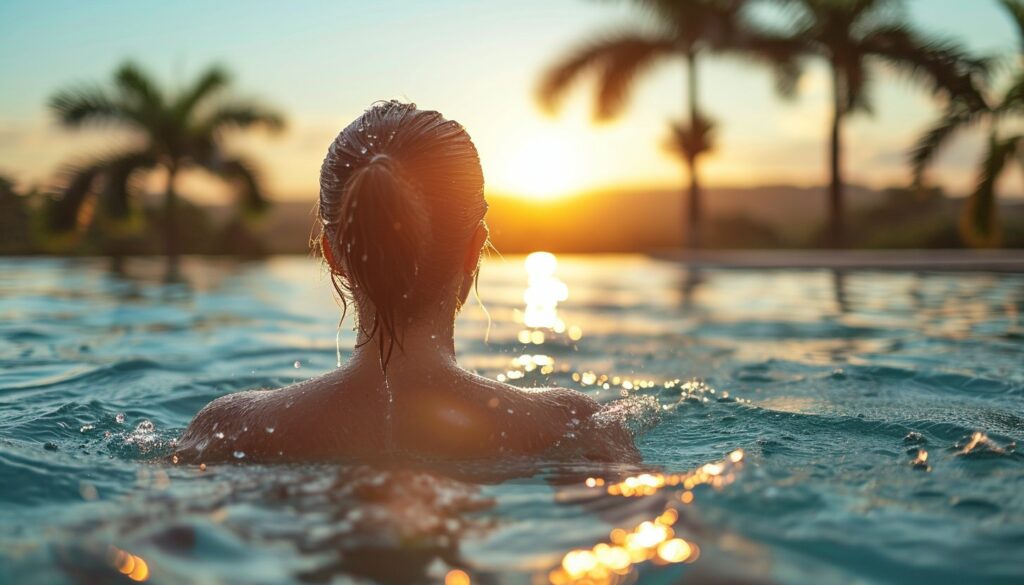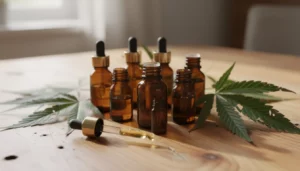With its multiple benefits, CBD (cannabidiol), a non-psychoactive compound found in cannabis, is gaining popularity among athletes of all levels. In this article, learn how swimmers can benefit from the properties of CBD to improve sleep, reduce anxiety, and support post-workout recovery.
Sommaire
ToggleThe virtues of CBD for restful sleep
One of the keys to successful sporting performance is to benefit from a sufficient, quality sleep. Yet it can be difficult for some athletes to get the rest they need due to stress or training-related pain. This is where CBD comes in.
How does CBD affect sleep?
CBD interacts with endocannabinoid system (SEC) of our body. This system notably regulates our sleep and wake cycles. Several studies show that taking CBD can help regulate these cycles and make it easier to fall asleep. In addition, CBD is also said to have a relaxing action that could help relieve stress and tension that hinder swimmers’ sleep.
Which form of CBD should you choose to improve sleep?
There are different forms of CBD, such as capsules, oils and even chewing gums. For maximum effectiveness on the quality of sleep, it is preferable to opt for ingestible products, which have a longer duration of action than topical methods of administration (creams, balms, etc.). Depending on individual needs and preferences, these products can be taken regularly or occasionally before bedtime.
Fight anxiety with CBD
Competitions and the demands of daily training can cause a certain level of stress and anxiety in athletes, including swimmers. However, a state of chronic anxiety can end up affecting performance as well as overall mental and physical health.
What are the effects of CBD on anxiety?
CBD is said to have anxiolytic and anti-stress properties, particularly due to its interaction with serotonergic receptors. Serotonin is a neurotransmitter playing an important role in mood regulation, stress management and relaxation. Several studies suggest that CBD could contribute to reduce anxiety symptoms, thus offering swimmers a natural and non-addictive way to better manage their stress.
How to use CBD to combat anxiety?
The choice of product and ideal dose depends on individual needs and preferences. Generally speaking, capsules or oils are the preferred forms to combat anxiety. To maximize the relaxing effect of CBD, it is advisable to include additional relaxation techniques in your routine such as meditation, yoga or deep breathing.
Promote optimal recovery with CBD
To progress in swimming, adequate recovery time after training is essential. The anti-inflammatory and analgesic properties of CBD can help improve swimmers’ recovery on several levels:
- Reduction of muscle pain: by acting on endocannabinoid receptors, CBD could help reduce pain sensations and promote muscle relaxation.
- Fight against inflammation: CBD has anti-inflammatory properties that could help reduce training-related inflammation.
- Improved blood circulation: some research indicates that CBD may facilitate vasodilation, thereby improving the delivery of oxygen and nutrients to the muscles, which promotes their recovery.
Which form of CBD should you choose for recovery?
For effective recovery, one can opt for ingestible forms of CBD such as capsules or oils. However, CBD-based balms and creams can also be useful when applied directly to painful muscle areas. To benefit from optimal recovery, it is important to dose the CBD correctly and adapt its intake according to needs: some swimmers will favor preventive use before training, while others will prefer to consume CBD after their session. to relieve muscle pain.
In summary, the use of CBD can bring many benefits to swimmers, whether it is to improve their sleep, better manage their anxiety or even promote their recovery after exercise. However, it is crucial to choose your products carefully, to respect current legislation and to consult a health professional before integrating CBD into your sports routine.



